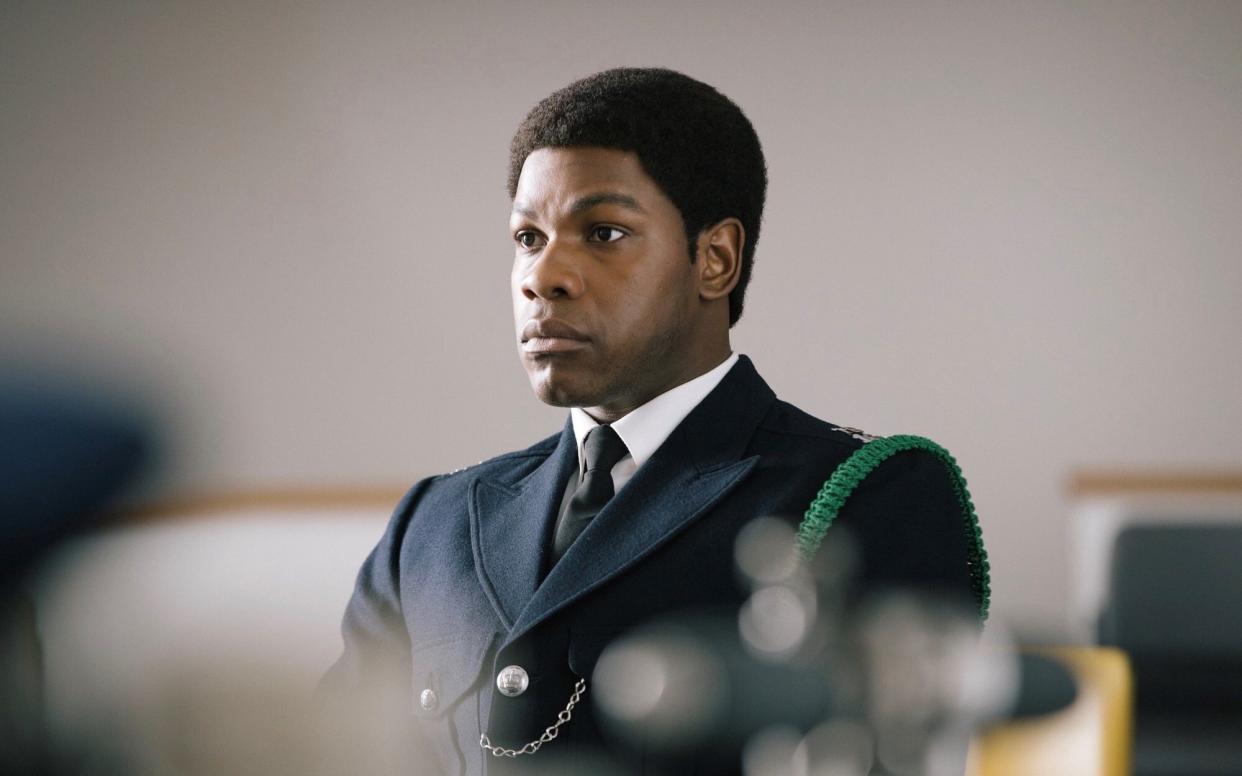Red, White and Blue review: Steve McQueen's taut Met drama gives John Boyega his meatiest role yet

Dir: Steve McQueen. Starring: John Boyega, Steve Toussaint, Antonia Thomas, Nadine Marshall, Tyrone Huntley, Neil Maskell. Cert tbc, 78 mins
A long time ago in a galaxy, far, far away – well, Islington in 1982 – Leroy Logan (John Boyega) has a confession to make. “I want to join the Force,” the hero of Red, White and Blue sheepishly announces to a friend. “What?” the pal chuckles. “You’re gonna be a Jedi or something?”
Of course, Boyega himself ticked that one off his to-do list a while ago. The 28-year-old was a leading light in the latest Star Wars trilogy, in which he established himself as one of the most charismatic young actors around. As for Leroy, his actual ambition – to join the Metropolitan Police in an era when racial divisions were rife, and the force itself overwhelmingly white – isn’t too far removed from science-fiction itself.
History tells us things worked out in the long run. Logan retired from the Met in 2013 after rising to the rank of superintendent, and was awarded an MBE in 2001. But Steve McQueen’s brooding and muscular new film – one of five in his Small Axe anthology of stories from British West Indian life – is less concerned with the long arc of the moral universe than its treacherous foothills, where the course of events can be determined by a single scramble or slip.
A more conventional treatment of Logan’s story might have framed it as a triumph-over-adversity tale, perhaps ending with his investiture ceremony, at which our outsider hero is conclusively accepted by the British establishment. But with a cliche-busting flourish, McQueen and his co-writer Courttia Newland follow him for just a few years, and leave him – and us, for that matter – stranded at a point at which the actual value and impact of his efforts remain shrouded in doubt.
Red, White and Blue is a film which regards history as a live issue – but also one that proudly and playfully acknowledges its place in the great tradition of rough-and-ready British street-level police dramas. One pivotal chase scene, staged in a handful of sinuous long takes, even takes place in a cardboard box factory, with enough smashing through stacks of corrugated cartons to make The Sweeney jealous. Boyega’s Leroy, though, is no Jack Regan: he can’t afford to be. In a field where a black man has to excel to be so much as noticed, he has to play things meticulously by the book.
Not that it wins him many friends on either side. Leroy is driven by his determination to build bridges between the police and his community, but regularly finds himself rejected by both for his efforts. At the station, he is the target of mutters and smirks, and sometimes far worse – while out on the beat, black youths call him a coconut (that is, brown on the outside but white on the inside) and a Judas. “That’s constable Judas to you,” Leroy jabs back, though Boyega makes you feel the word’s sting, even as his character tries to shrug it off. Those who saw Kathryn Bigelow’s Detroit will know that Boyega is a great silent processor of situations – and as Leroy wrestles with his conscience, deciding when to speak up and when to step back, it’s as if his thoughts are passing across his face, like a heart monitor’s blip.
A particular source of friction is Leroy’s relationship with his father Ken (Steve Toussaint), who is himself a (very recent) victim of police brutality when his son applies to join the force. Toussaint brings a powerful woundedness and indignance to his performance as a man who sees his boy’s chosen career as an act of betrayal. But in a beautifully underplayed moment outside the Hendon Police College, they reconcile in the traditional faltering, back-patting manner, while the camera remains at a bashful remove.

McQueen’s eagle eye for the telling details of ordinary life is one of the great pleasures of the Small Axe project so far: here it’s the wary intensity of the central father-son relationship, as well as the differences in outlook between the West Indian community’s first and second generations. When Leroy’s girlfriend Gretl (Antonia Thomas) blithely lays down ‘sex’, for 10 points, during a family game of Scrabble, the room silently and hilariously falls in two.
Perhaps Red, White and Blue lacks the sheer revolutionary swagger of the other two Small Axe films that played New York this year: the euphoric, transporting Lovers Rock and the soul-prickling courtroom drama Mangrove, the latter of which opens the London Film Festival next week. Yet it moves with a taut and prowling assurance, and gives Boyega a role of nuance, significance and depth. McQueen’s Small Axe continues to clear a space for itself at the very heart of British cinema.
Red, White and Blue premiered on October 3 at the New York Film Festival. It will screen later this year on BBC One and BBC iPlayer as part of Small Axe, a collection of five films created by Steve McQueen.
